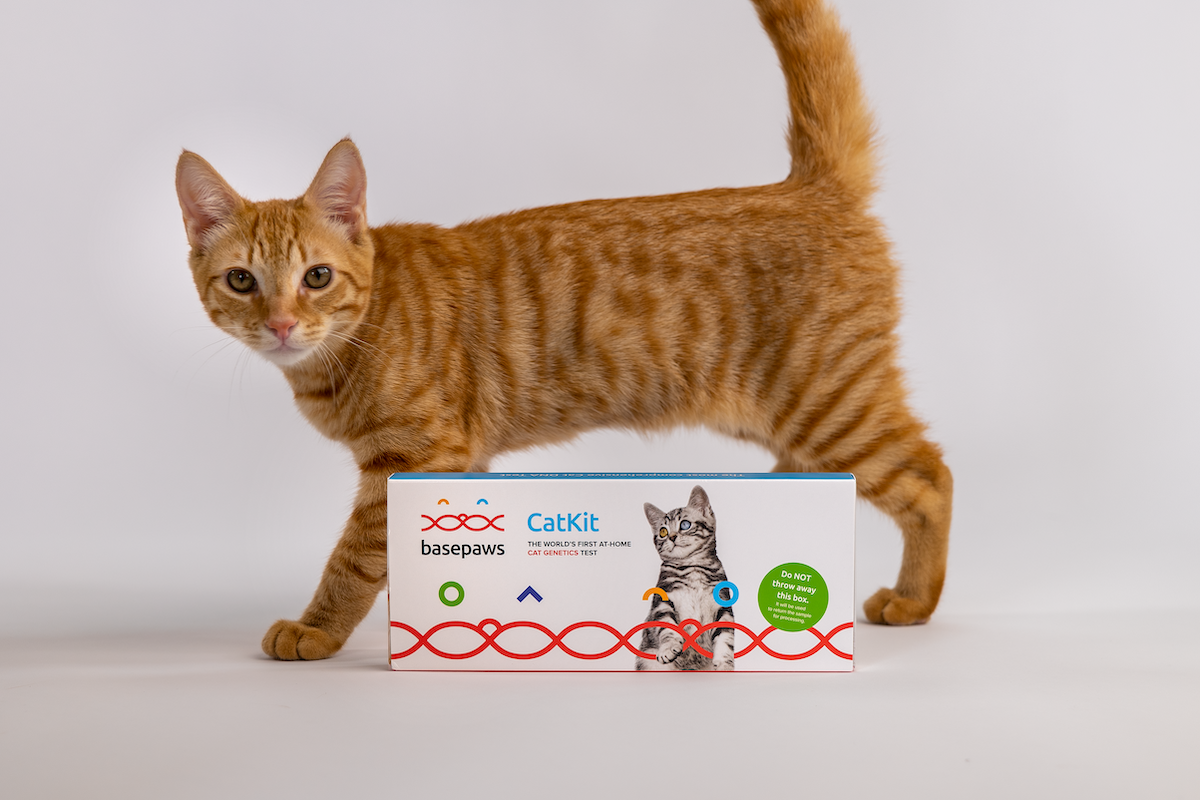We have a saying here at Basepaws: “Different breeds, different needs.” However, even within and across feline breed groups, individual cats embody a unique composition of genetic traits that relate to their needs for optimal health and wellbeing.
In 2018, Basepaws launched the world’s first at-home cat DNA test kit. We frequently get asked to share the specific reasons for why cat parents should DNA test their beloved felines. For one, the data gathered from the Basepaws test is revolutionizing pet parents’ understanding of their cats, as well as providing actionable knowledge to share with their veterinarians to plan customized, timely healthcare. We’d like to share a few more advantages:
It’s Easy
The Basepaws cat DNA test is so user-friendly that it only takes three easy steps to complete. Upon receipt of the test kit, you (1) register it online and create your cat’s profile (if you don’t already have one); (2) use the enclosed oral swab to collect a saliva sample from your cat’s mouth; and (3) mail the sample that you collected back to the Basepaws lab using the prepaid return shipping label we include with your kit. You can expect us to share our analysis of your cat’s sample with you 4-6 weeks from the date that we received it at our lab. This digital report will provide you with clear, detailed results that are based on years of feline genetics research and backed by veterinarians.
It’s Enlightening
Using a large reference panel of purebred and mixed-breed cats (the latter are known at Basepaws as ‘polycats’) that we have sequenced at high depth, the Basepaws feline DNA test reveals the regions of your cat’s genome that are similar to particular genomic regions seen in any of the 21 different breeds that comprise our reference panel. Your breed analysis report will contain a brief overview of each breed with which your cat shares genetic similarity, as well as information currently known about a breed’s origins, personality, genetic predisposition, and any health risks that may be associated with a particular breed type.
It is through an analysis of the haplotype blocks of your cat's genome that Basepaws begins to unlock the mysteries of your cat’s genetic history. Haplotype blocks are a set of DNA variations, or polymorphisms, that tend to occur more frequently in some breeds versus others. This is because every breed has their own haplotype inheritance pattern, so haplotype blocks can be used to assess a cat’s similarity to other breeds. As shown in Figure 1, different breeds have a characteristic combination of alleles that are inherited together within each haplotype block (1st row).
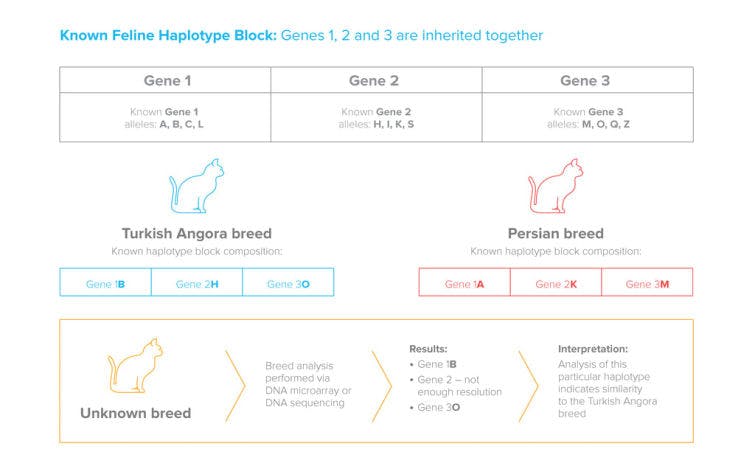
Figure 1. Illustrative example of the use of haplotype blocks in cat breed analysis.
When haplotype blocks from your cat’s genome are analyzed, their composition is compared to the composition of the known feline haplotype blocks for the 21 breeds in our reference panel. These comparisons will reveal any similarities between your cat’s genome and the representative genomes for these breeds. To illustrate this concept, the example in Figure 1 shows that an analyzed cat DNA sample (unknown breed, third row) has genetic similarity to the haplotype block compositions of the Turkish Angora and Persian breeds (second row).
While dogs have undergone centuries of selective breeding, it wasn't until the 19th century that humans began to influence cat evolution through selective breeding for the (largely aesthetic) traits that have led to our modern concept of a “purebred” cat. Before that time, cats were largely free to reproduce on their own terms. The purebred cat DNA samples for the Basepaws reference panel come from contemporary, certified purebred cat breeders. The cats to whom these samples belong are considered modern-day representatives of feline purebreds. That is why the Basepaws feline breed analysis can only tell you how similar your cat’s genome is to modern-day representatives of the purebred feline breeds in our reference panel—let’s use the Norwegian Forest Cat breed as an example—but cannot make any assumptions that one of your cat’s direct ancestors was a Norwegian Forest Cat. While it may be the case that this purebred cat is indeed present somewhere in your cat’s ancestry, an equally plausible explanation is that your cat simply shares a common ancestor with the modern Norwegian Forest Cat breed represented in our panel (hence, your cat’s genomic similarity with that breed).
It’s Accurate and One-of-a-Kind
To build a thorough high-resolution haplotype map, a reference panel should contain genome sequencing data from hundreds or even thousands of cats that represent diverse breeds and geographic locations. This is because the evolution of feline breeds is inextricably connected to the ancestral and geographic history of the cat species.
Basepaws continues to build its database by sequencing the DNA of multiple cats from different geographical locations and different breeds, including mixed-breed cats. The more purebred samples we add to our reference panel in our database, the more accurately we can identify the specific genomic regions that define purebred cats and their traits.
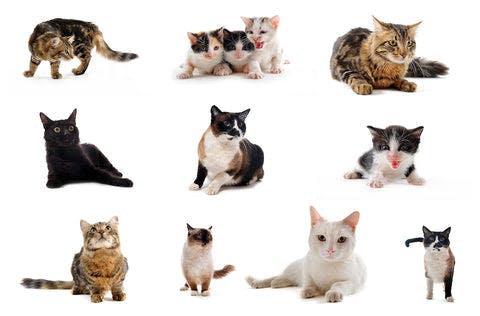
As we grow our database and reference panel, we will release updates to your cat’s original breed analysis report at no cost to you. In essence, your digital report is a “living document” that continues to reflect information with greater accuracy over time. For example, your first report may reveal that your cat shares genomic similarity predominantly with the western cat breed group, and that your cat’s genome is 32.51% similar to the Abyssinian breed within this group. However, an updated report may reflect a different percentage of Abyssinian or domestic polycat because brand new purebred and mixed-breed cat DNA samples were added to our database that weren’t in it when your cat was first tested. Basepaws continues to analyze your cat’s DNA sample against these changing data points so that you receive the most up-to-date information about the similarity of your cat’s genome to those of the different breeds in our report.
It’s an Affordable Tool for Safeguarding Your Cat’s Health
The Basepaws DNA test also identifies 64 feline genetic health markers that are associated with 43 genetic disorders, two additional genetic health markers associated with hypertrophic cardiomyopathy (HCM) to let you know if your cat may be at a higher risk for the disease. These results help you gain a clearer picture of your cat’s current state of health, as well as provide a roadmap that will support you to effectively manage their long-term health and wellness. We also screen for 25 genetic traits represented by 50 genetic markers! The new traits section of the Basepaws digital report presents a summary of some of the genes and mutations that are responsible for a cat's unique physical appearance. It also includes results for a non-aesthetic trait that is important to a cat’s health: the likelihood of resistance to the Feline Immunodeficiency Virus (FIV).
For more details, you can review the complete list of feline genetic disorders currently included in the health markers section of a Basepaws report.
A genetic marker is a DNA sequence with a known physical location on a chromosome that can help link an inherited disorder with a gene. Genetic disorders are conditions that are caused by one or more genetic mutations—these conditions may be present at birth or arise later in life.
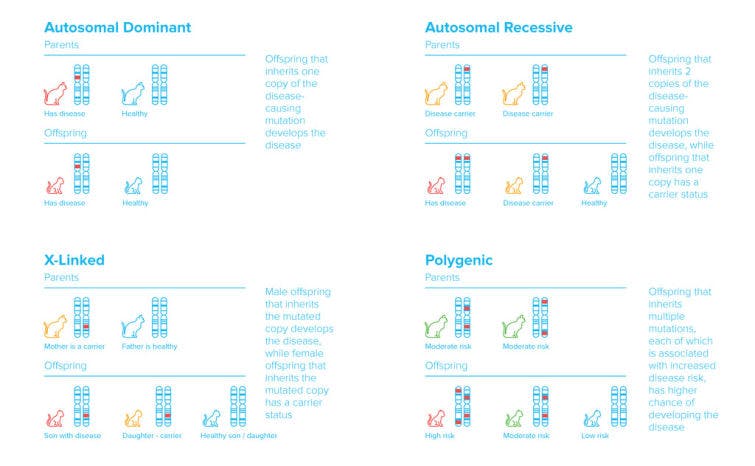
Figure 2. Inheritance patterns of genetic diseases.
In the ‘Health Markers’ section of the DNA report that you will receive, Basepaws offers four health marker status designations: (1) Clear* – cat is negative for the disease-associated marker tested; (2) Carrier – cat has one copy of an autosomal recessive disease-associated marker (this should only be a concern if you plan to breed your cat); (3) At Risk, and (4) At High Risk – these latter two designations can mean that your cat has tested positive for a dominant allelic mutation or has two copies of a recessive allelic mutation. If you receive one of these two result designations, you should contact your veterinarian.
*NOTE: a ‘Clear’ result does not mean that a cat is guaranteed to not develop the disease. It simply means that the cat is negative for the mutation tested. There may be environmental factors and/or other not yet known genetic mutations that could contribute to the potential development of the disease.
It’s Information to Help You Help Your Cat
Basepaws aims to improve the lives of cats around the world by understanding, genetically, what makes each cat unique. In addition to lending insight into your cat’s genetic similarity to the breeds in our reference panel, the Basepaws at-home cat DNA test is a digital health screening tool that puts you in charge of proactive healthcare for your cat. With genetic health marker status designations at your fingertips, the risk levels associated with current and/or potential diseases in your cat are identified earlier. Early detection allows you to collaborate with your veterinarian on a personalized care plan that helps to minimize stressful and costly emergency vet visits because you are prepared with detailed information about your cat’s health.
It’s always important to remember that the results that you receive in a Basepaws report are meant to augment—but not replace—a veterinarian’s evaluation and clinical diagnosis of your cat. Read our latest sample cat DNA test report to gain a better understanding of the information that we share with pet parents like you.
Just sign up, swab, and send!
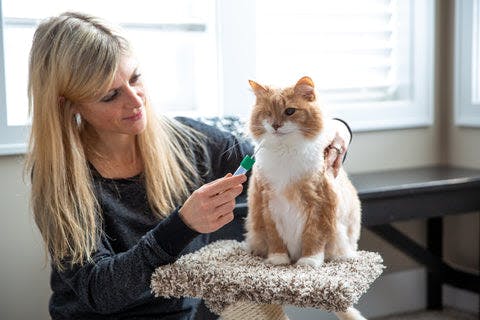
We hope that this post has provided insight into some of the benefits of and interesting science behind feline genetics research here at Basepaws, and that you are inspired to explore the range of our at-home cat health test offerings that can help you support your cat’s optimal health and wellbeing. Remember, it’s so easy—all that is required is that you sign up, swab, and send!
